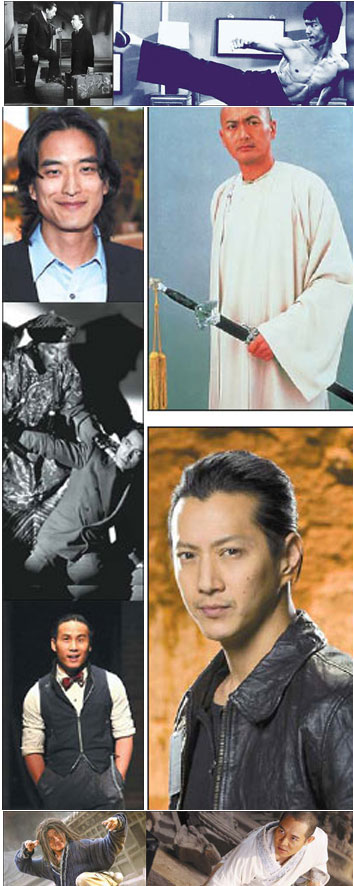 |
|
Hollywood films featuring Asian actors (clockwise from top left): Charlie Chan, Bruce Lee, Chow Yun-fat, Yun Lee, Jet Li, Jackie Chan, B. D. Wong, Fu Manchu and Jack Yang. [File photos] |
When American network NBC revamped hit 1970s TV series "The Bionic Woman" in 2007, they chose Korean-American actor Will Yun Lee to play Jae Kim, the operations leader who teaches the lead character, Jaime Sommers, how to use her powers. It was a meaty role and in one episode, Lee even had a love scene with American actress Katee Sackhoff.
In "Cashmere Mafia," Lucy Liu dates Korean actor Jack Yang, who has impressive social manners, masculinity and a highly prestigious job as a brain surgeon.
These might sound like trivial anecdotes but casting such Asian characters in high-profile American shows would have been inconceivable just a few years ago, when Chow Yun-fat never got to kiss Mira Sorvino in "Replacement Killers" and Jet Li's kiss with Aaliyah was edited out of "Romeo Must Die".
"The rise of the Asian economies, including China's, is making American people more interested in the region and compelling TV and film makers to do wider and deeper research," says Yan Luo, the Shanghai-born actress who went to the United States in the 1980s and directed/produced the 2001 movie 'Pavilion of Women," which focused on cross-cultural relationships.
She has a keen interest in how Asian people were all too easily stereotyped for many years. "The decades-long lack of effective communication and the indifference of a powerful culture to weaker ones should be taken into consideration when we talk about the depiction of Asians in the US mass media," she says.
For a long time after their debut in the 1919 silent film "Broken Blossom," Asian males were confined to limited roles in American films and TV. One was the learned ancient scholar powered by a mysterious oriental philosophy, like the detective Charlie Chan, who quotes supposed ancient Chinese wisdom at the end of each story, saying things like: "The Emperor Shi Hwang-ti (Qinshihuang), who built the Great Wall of China, once said that 'he who squanders today talking of yesterday's triumphs will have nothing to boast of tomorrow.' "
Others were the studious nerd, like B.D. Wong's researcher in "Jurassic Park," or the violent villain, of which the best known was Dr Fu Manchu, the incarnation of "yellow peril" with a face like Satan.
Another Asian male stereotype is the feminine and emasculated man. "Remember Mickey Rooney" as the bucktoothed Japanese landlord who sneaks a peep at Audrey Hepburn in "Breakfast at Tiffany's" or the nerd Long Duk Dong in John Hughes's 1984 adolescent classic "Sixteen Candles?" These gross simplifications may seem laughable today but for many years they had a profound influence on American audiences' perception of Asian men.
In "Slanted Screen", a documentary directed by Jeff Adachi about the long-time stereotyping of Asian males, comedian Bobby Lee of MAD TV says: "My nickname was 'Long Duk Dong' in high school because of that character, and I think every Asian guy that ever went to an American school earned the nickname Long Duk Dong because of that character. That means that you're not going to get any girls."
Even more insulting for Asian actors was that their roles often went to Westerners. Westerners played Fu Manchu in the series, many versions of Charlie Chan - even Swedish actors, for goodness sake - and the two lead characters in "The Good Earth," a film about a Chinese peasant couple.
Their so-called "yellow faces" were created with dark make-up, glue to narrow and slant the eyes, plus false buckteeth. This charade became less popular in the 1960s, when an Asian cast had dominated the 1961 hit "Flower Drum Song."
Jiang Nikang, professor of American culture studies at Nanjing University, says an awakening world also played a role in the changing attitudes.
"The Civil Rights Movement in the 1950s and 60s brought about a social atmosphere that was more open and democratic," says Jiang.
"Asians and other minority groups, were striving for more rights in various social walks."
The pace of change quickened after Bruce Lee's classic kungfu flick "Enter the Dragon" in 1973. Although to some he seemed to be just another one-dimensional macho hero, Yan Luo thinks his appearance marked a significant shift for Asian-Americans, both as actors and as men.
"Before Lee, Asian men were often portrayed as sly and effeminate," Luo says. "Lee brought a new image of artistic strength and masculinity."
Lee's stellar career paved the way for the later success of several Chinese actors in Hollywood, including Jackie Chan, Chow Yun-fat and Jet Li.
Compared to many Asian-American actors who struggled so much back home, those three were handed numerous plum roles. They each possessed unique characteristics - Chow the gentle one, Chan the funny man and Li the martial arts expert - even if none achieved real A-list status.
"It takes time to know a country and its people," says Luo. "It is quite normal that a group of people will stereotype another they do not know well. In our films and TV there are stereotyped Westerners, too. The only way out is to communicate and learn more."
Jiang is optimistic, too. "Cultural exchanges between Asia and the rest of the world are growing rapidly and wider now," he says. "As Western people get to see and get along with more Asians, they will also understand each other better."
(China Daily February 25, 2009)